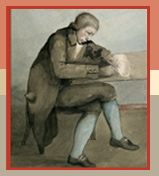
Iolo's Life
Autobiographical material (NLW 21387E)
The Agricultural Observer and Farmer
The Opium Eater
Taking laudanum, tincture of opium, was both common and fashionable during the eighteenth century. That 'To Laudanum' is the opening poem in Iolo's Poems, Lyric and Pastoral (1792) acknowledges this fact. Famous opium eaters include Samuel Taylor Coleridge, George Crabbe and Thomas De Quincey. David Samwell regularly took laudanum and also procured it for Iolo.
Iolo started taking laudanum as a young man to cure a troublesome cough (21387E, nos. 6 & 10) and was dependent on the drug by 1792. This, as well as his dire financial and professional worries, account for the deep depression he experienced during the summer of that turbulent year. In 1805 the philosopher David Williams (1738-1816) expressed his concern that Iolo was not careful enough of his health: 'Your account of your own health is deplorable. Your diet & beverage are not sufficiently stimulating. You depend too much on opium, foxglove &c.' (NLW 21283E, Letter 552, David Williams to Iolo Morganwg, 22 August 1805).
The result of this addiction to laudanum is clear on Iolo's mindset and work. In her study of the effects of laudanum on the imagination of writers of the Romantic period, Alethea Hayter has shown that laudanum appealed to users because it offered them a respite from their worries and also produced in them a sense of euphoria. It is generally believed that the drug does not enrich a dull imagination but rather enhances one that is already active. Laudanum produced a paradoxical effect on users. On the one hand, it gave them the impression that their ideas were clearer and more original because of the laudanum: it enabled them to create unexpected creative links, and also bolstered their belief in the distinctness of their own visions. On the other hand however, laudanum impaired their ability to concentrate and one of its cruellest effects was that it hindered opium eaters from realizing the thrilling plans it had inspired in them in the first place.
In an article on the effects of laudanum on Iolo Morganwg, Geraint Phillips has shown that the drug was, for him, an escape from the pressures of life. Moreover, it gave Bardism its unique and startling shape, and also deepened Iolo's Messianic mission to bring his bardic vision to the attention of an ignorant world.
Iolo's letters to his wife, Margaret, give a poignant depiction of some of the most unpleasant side-effects of his laudanum addiction: hysteria, headaches, mental confusion, insomnia, overwhelming guilt, intellectual stupor and severe self-criticism and dissatisfaction with the standard of his own work. Laudanum also intensified his tendency towards paranoia and arguing with friends and acquaintances.


